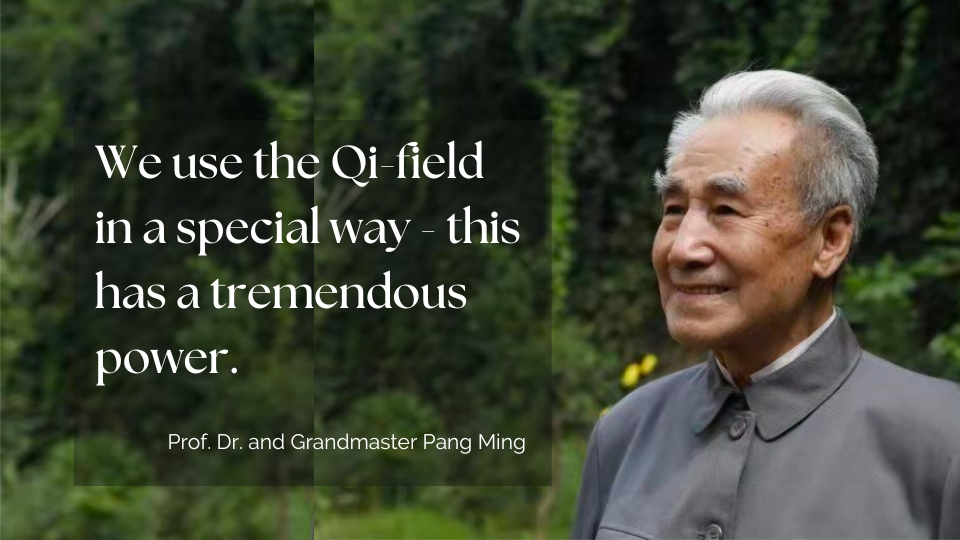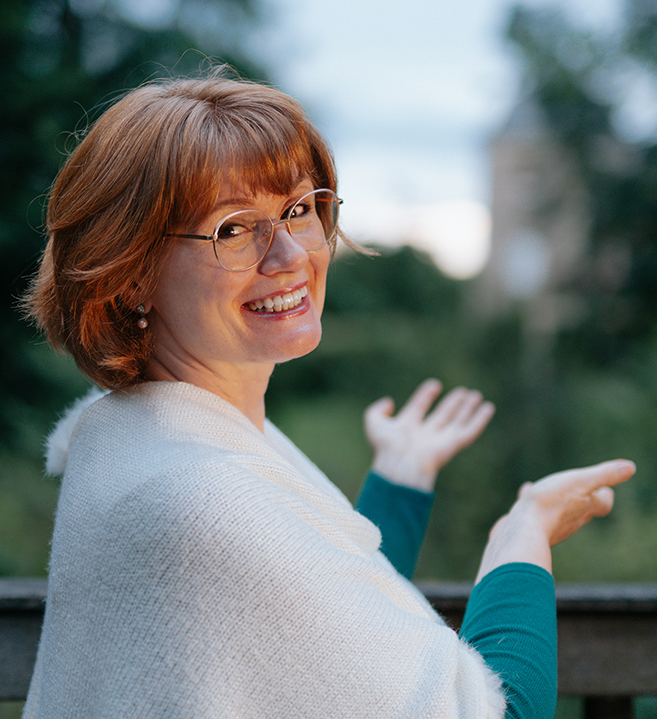Was bedeutet „Intelligentes Qigong“ und wer kann es praktizieren?
Zhineng Qigong (智慧氣功) is referred to as “intelligent Qigong” . The literal translation consists of:
- Zhi (智): Intelligence, wisdom, knowledge
- Neng (慧): Ability, potential
- Qi (氣): Life energy, life force
- Gong (功): Work, practice, artistry
All exercises are done either standing or sitting on a chair. So we don't sit in an uncomfortable cross-legged position.
Everyone can practice these exercises - age doesn't matter. A health measure for all people.
Will man intelligenes Qigong mit Methoden der westlichen Welt beschreiben, so ist es sehr treffend zu sagen, dass wir über eine Kombination von
– Körpertraining,
– Progressiver An- und Entspannung der Muskeln
– Autogenem Training,
– Emotionale Arbeit,
– Visualisierung,
– Bewusstseinsarbeit und
– Meditation
zugleich sprechen.
The crucial difference, however, is that we use Qi (life energy) powerfully to work on three levels of holistic health in order to bring everything into... to bring natural balance. Yin and Yang in balance.
Die erste Ebene oder Schicht der Gesundheit ist die physische Materie. Also alles, was physisch sichtbar und berührbar ist – so wie der menschliche Körper.
The second level is the level of energy.
99.99 percent of our universe is invisible matter/energy, says science. 99.99 percent! For what reason should we assume that we are not part of this energy?
Qigong has been working with it for thousands of years.
The third level is that of information.
Thoughts. Memories. Ideas. emotions.
This level is very closely connected to our consciousness and has a decisive influence on the way people think, feel and act.
Studies
Zhineng Qigong is a Science in China and that is why there are many studies by Chinese scientists; Internationally, Western medical professionals' interest in this extraordinary form of Qigong is constantly growing. It is also called medical Qigong. There is a lot of research being done related to cancer.
(RCTs = randomized controlled trial / randomisierte, kontrollierte Studie)
- Studie: Zhang, Y., et al. (2013). Effects of Zhineng Qigong on immune function in healthy adults: A systematic review and meta-analysis of randomized controlled trials. Evidence-Based Complementary and Alternative Medicine, 2013.
- Results: Meta-analysis of 5 RCTs with 320 participants showed significant improvements in immune function, e.g. increasing the number of T cells and NK cells.
- Summary: Strengthening the immune system through Zhineng Qigong in healthy adults.
- Studie: Chen, Y., et al. (2017). The effect of Zhineng Qigong on quality of life in patients with cancer: A systematic review and meta-analysis of randomized controlled trials. Integrative Cancer Therapies, 16(4), 594-603.
- Results: Meta-analysis of 8 RCTs involving 521 cancer patients showed significant improvement in quality of life.
- Summary: Improving the quality of life of cancer patients through Zhineng Qigong.
- Studie: Li, Y., et al. (2023). Effects of Zhineng Qigong on cognitive function in older adults: A systematic review and meta-analysis of randomized controlled trials. Frontiers in Aging Neuroscience, 15, 1007383.
- Results: Meta-analysis of 12 RCTs with 876 participants showed significant improvements in cognitive functions, e.g. memory, attention, executive functions.
- Summary: Promoting cognition in older adults through Zhineng Qigong.
- Studie: Wang, C., et al. (2017). The effect of Zhineng Qigong on fatigue and exhaustion in patients with cancer: A systematic review and meta-analysis of randomized controlled trials. Journal of Clinical Nursing, 26(15-16), 2422-2433.
- Results: Meta-analysis of 8 RCTs with 543 participants showed significant reductions in tiredness and fatigue.
- Summary: Reducing tiredness and fatigue in cancer patients using Zhineng Qigong.
- Studie: Li, Y., et al. (2019). Effects of Zhineng Qigong on psychological well-being in cancer patients: A systematic review and meta-analysis of randomized controlled trials. Complementary Therapies in Medicine, 44, 153-163.
- Results: Meta-analysis of 10 RCTs with 658 participants showed significant improvements in psychological well-being, e.g. reductions in stress, anxiety and depression.
- Summary: Improved psychological well-being in cancer patients through Zhineng Qigong.
- Studie: Wang, C., et al. (2017). The effect of Zhineng Qigong on fatigue and exhaustion in patients with cancer: A systematic review and meta-analysis of randomized controlled trials. Journal of Clinical Nursing, 26(15-16), 2422-2433.
- Results: Meta-analysis of 8 RCTs with 543 participants showed significant reductions in tiredness and fatigue.
- Summary: Reducing tiredness and fatigue in cancer patients using Zhineng Qigong.
- Studie: Yu, F., et al. (2015). The effects of Zhineng Qigong on energy and vitality in healthy adults: A systematic review and meta-analysis of randomized controlled trials. Journal of Traditional and Complementary Medicine, 5(4), 294-301.
- Results:Meta-analysis of 5 RCTs with 302 participants showed significant increases in energy and vitality.
- Summary: Increasing energy and vitality in healthy adults through Zhineng Qigong.
- Studie: Yu, F., et al. (2020). The effects of Zhineng Qigong on energy and vitality in healthy adults: A systematic review and meta-analysis of randomized controlled trials. Journal of Traditional and Complementary Medicine, 10(4), 469-476.
- Results: Meta-analysis of 7 RCTs with 421 participants showed significant increases in energy and vitality.
- Summary: Increasing energy and vitality in healthy adults through Zhineng Qigong.
- Studie: Li, Y., et al. (2017). Zhineng Qigong for improving sleep quality in cancer patients: A systematic review and meta-analysis of randomized controlled trials. Comple
- Results: Meta-analysis of 8 RCTs with 492 participants showed significant improvements in sleep quality, sleep duration and reduction in sleep disorders.
- Summary: Improved sleep quality through Zhineng Qigong in cancer patients.
- Study: Wu, J., et al. (2021). The effect of Zhineng Qigong on sleep quality in people with chronic pain: A systematic review and meta-analysis of randomized controlled trials. Journal of Pain Research, 14, 2909.
- Results: Meta-analysis of 8 RCTs with 548 participants showed significant improvements in sleep quality, sleep duration and reduction in sleep disturbances
- Summary: Improved sleep quality in people with chronic pain using Zhineng Qigong. Health.
There are many more studies on health with Zhineng Qigong. For example, use the databases PubMed and Google Scholar use, to find further studies.
For thousands of years (first written mention in 2,600 BC), Qigong was China's best-kept health secret, a hidden treasure behind the walls of ancient monasteries and temples as well as in thrived in the private villas of wealthy Chinese. It was an art of merging body, mind and soul into a harmonious unity.
In the past, Qigong was only passed down orally from master to student, a precious heritage available only to the select few in the inner Qigong circle (Nei-Jia). There, in the closed world of the Qigong family, the secrets of energy exercises to strengthen the body and mind were revealed.
But today the tide has turned, and Qigong is radiating its light to all corners of the world.
The Qigong form "Zhineng Qigong" is officially considered in China to be the most effective medical form of Qigong with health-promoting effects and is practiced by millions of people around the world. Based on a scientifically based approach, Zhineng Qigong combines special movement exercises with visualizations and powerful meditations to bring body, mind and soul into harmony. Zhineng Qigong has been a recognized science in China since 1998.
Professor Dr. Pang Ming, the pioneer in this field, says: “The true art of life is to balance body and mind.”
He developed Zhineng Qigong in the 1970s at the request of the then Chinese government. Dr. At that time, Pang was already one of the most famous Qigong grandmasters in China. Also
TCM professor and western professor doctor.
He took the 12 most renowned Qigong forms and 7 other Asian healing forms as a basis and traveled through China and Asia for around 10 years to expand his knowledge. During this time he studied these healing arts with 19 grand masters, extracted the essences of these ancient wisdom and methods and then developed them further. In addition, he has integrated in-depth knowledge of TCM (Traditional Chinese Medicine) and Western medicine.
The result: Zhineng Qigong – translated as above explains in more detail, it means "Intelligent Qigong."
Today Dr. Pang is still working in research and enjoys excellent health being over 85 years old.


- Rechtliche Hinweise (1 (2:
Zhineng Qigong, Meditationen, sowie alle energetischen Methoden sind als ergänzende Maßnahmen zur Schulmedizin zu betrachten. Sie stellen keine Heilversprechen dar, sondern zielen darauf ab, Körper, Geist und Seele in Einklang zu bringen und die Selbstheilungskräfte zu stärken. Bei Diagnose und Behandlung von Krankheiten ist es ratsam, sich an einen Arzt oder Therapeuten zu wenden.
Der Begriff „Hunyuan Qi Therapie“ wird im Kontext des Qigong verwendet. Diese Therapie stellt in der westlichen Medizin/Schulmedizin keine eigenständige Therapiemethode dar und kann keine bereits verordnete Therapie eines Arztes oder Therapeuten ersetzen. Sie dient vielmehr dazu, bestehende Therapieansätze zu ergänzen und den Heilungsprozess ganzheitlich zu unterstützen. ↩︎





